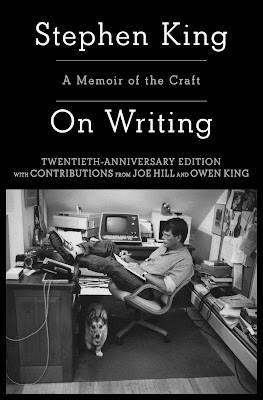For several generations, Stephen King has been one of the most influential authors when it comes to genre fiction. Both in terms of quantity and quality, he has released a great amount of work that has reshaped pop culture and has made him one of the most respected voices. Given that he's also one of the most accessible famous authors from the 20th century, it makes sense that he would want to write a book sharing some of his secrets. While it's far from the academic aura of other texts, King manages to break down "On Writing" to a language that connects him to his reader by showing that everyone is capable of becoming an author with enough hard work. As someone who used to write schlocky horror stories for b-movie magazines, he knows very well the struggle to be accepted. The results are at times insight, others soporific, but overall it's one of his most staggering works in his career for how it tears back the curtain of what one would expect and shows the humanity that goes into a fairly daunting process.
It would be easy to be intimidated by King giving you writing advice. As someone who's published dozens of novels and often several in one year, he seems like someone who would have a very opinionated take on the subject. However, he is so down to earth that this memoir quickly breaks down the process from simply a story of how to use language properly ("no adverbs!") and moves onto his own journey with writing. If this book is stuffy, it's only that way for a quarter of the book, where his red pen of analysis comes out to reflect on how he forms sentences and the small things that irritate him. With that said, he is candid enough to know that he makes these mistakes occasionally. There is an awareness that writing isn't perfect on the first draft and that being indulgent is at times important to reaching the better self. The way he does it is like one of the friendliest English teachers you haven't had since high school.
The rest of the memoir has the gift of being autobiographical. After decades of reading fiction, he finally breaks down what drives him as a person, highlighting major writing achievements throughout his life. With that said, the appeal of memoir is dependent on the individual as he does treat his life like a movie at times, willing to go in the familiar King humor directions that make you wonder what makes any of this significant. With all of that said, the final stretch where he discusses the book's real intent is the most powerful. It focuses on his famous car crash story that almost made him quit writing. The effort to restart motivated him in ways that are inspiring, showing that the necessity for writers to write is something that will help anyone through hard times. King has come back stronger over the 20 years since "On Writing," and it's impressive to see how he's using memoir as a way to rebuild identity and find the real reason that he wants to do this.
"On Writing" is a great tribute to an author who has done an insurmountable for the medium. As someone aware of his gifts and is still humbled by his success, he manages to convey so much of his passion for writing within the pages. The reader feels an intimate connection with King, allowing for a sense of one on one training to hone something better and notice that there are good and bad days on their journey. The trick is to not let the bad ones ruin the progress. Make the bad days a chance to learn and grow from them. Everything should help inspire you to be your better self. King has more than one bad days and it's only inspired him to produce so much art. Not all of it is great, but the fact that he keeps trying to make something that makes him feel alive matters more than any paycheck.

No comments:
Post a Comment